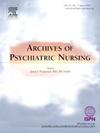A scoping review of literature: What has been studied about mental health problems among individuals with ankylosing spondylitis?
IF 2.2
4区 医学
Q1 NURSING
引用次数: 0
Abstract
Background
Research on mental health problems in individuals with ankylosing spondylitis (AS) has rapidly expanded since 2013. However, the evidence in this field can appear fragmented due to the limited number of existing reviews that synthesize research findings.
Aim
To map the evidence regarding the prevalence, correlated factors, and interventions for mental health problems in the AS population.
Methods
This review followed Arksey and O’Malley's framework and the Preferred Reporting Items for Systematic Reviews and Meta-Analyses Extension for Scoping Reviews. Six electronic databases were searched for studies published in English since January 2013. Study quality was assessed using the Mixed Methods Appraisal Tool, and data were narratively summarized and reported.
Results
Seventy articles were included in this review. The prevalence rates of depression, anxiety, and sleep disorders ranged from 3.1 % to 66.0 %, 2.7 % to 78.0 %, and 1.7 % to 71.7 %, respectively. Correlated factors included sociodemographic variables, disease-related aspects, physical symptoms and function, and psycho-behavioral factors. Interventions were categorized into physical exercise, therapeutic, and psychosocial approaches.
Conclusions
Mental health problems are prevalent among individuals with AS, and the correlated factors are multidimensional. Interventions aimed at physical function, disease activity, and cognitive functions have been identified as critical strategies for addressing mental health problems. Further research is needed to design and develop effective interventions targeting these correlated factors, particularly psycho-social interventions, to prevent future deterioration.
文献综述:关于强直性脊柱炎患者心理健康问题的研究有哪些?
背景自2013年以来,有关强直性脊柱炎(AS)患者心理健康问题的研究迅速发展。方法本综述遵循 Arksey 和 O'Malley 的框架以及《系统综述和元分析扩展报告优选项目》(Preferred Reporting Items for Systematic Reviews and Meta-Analyses Extension for Scoping Reviews)。我们在六个电子数据库中检索了自 2013 年 1 月以来发表的英文研究。采用混合方法评估工具对研究质量进行评估,并对数据进行叙述性总结和报告。抑郁症、焦虑症和睡眠障碍的患病率分别为 3.1% 至 66.0%、2.7% 至 78.0%、1.7% 至 71.7%。相关因素包括社会人口变量、疾病相关因素、身体症状和功能以及心理行为因素。干预措施分为体育锻炼、治疗和心理社会方法。针对身体功能、疾病活动和认知功能的干预被认为是解决心理健康问题的关键策略。需要进一步开展研究,针对这些相关因素设计和开发有效的干预措施,特别是社会心理干预措施,以防止未来病情恶化。
本文章由计算机程序翻译,如有差异,请以英文原文为准。
求助全文
约1分钟内获得全文
求助全文
来源期刊
CiteScore
3.70
自引率
0.00%
发文量
131
审稿时长
160 days
期刊介绍:
Archives of Psychiatric Nursing disseminates original, peer-reviewed research that is of interest to psychiatric and mental health care nurses. The field is considered in its broadest perspective, including theory, practice and research applications related to all ages, special populations, settings, and interdisciplinary collaborations in both the public and private sectors. Through critical study, expositions, and review of practice, Archives of Psychiatric Nursing is a medium for clinical scholarship to provide theoretical linkages among diverse areas of practice.

 求助内容:
求助内容: 应助结果提醒方式:
应助结果提醒方式:


